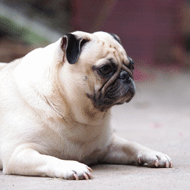
Research suggests nearly half of dogs in practice are overweight
The Brachycephalic Working Group (BWG) is warning pet owners about the serious health implications of obesity, particularly for brachycephalic animals.
BWG is made up of experts in brachycephalic dog health and dog welfare, as well as veterinary organisations, charities and breed clubs.
The group is urging owners to check their pet’s weight and seek veterinary advice about the impact it is having on their wellbeing. Owners are also advised to ask their vet whether their dog is a healthy weight at each vet visit.
Recent research by the BVA and BVNA estimates that nearly half of dogs (46 per cent) that vets and vet nurses see in practice each year are overweight or obese. Of these, nearly half (47 per cent) have health issues that could be related to their weight.
BWG chair Dr Dan O’Neill said: “Obesity is the third most impactful of the most common disorders that affect our dogs according to our RVC VetCompass research.
"But whilst obesity can harm any dog, it is of particular concern for brachycephalic dogs, because they have higher risks of breathing problems (Brachycephalic Obstructive Airway Syndrome (BOAS)) and an increasing level of excess bodyweight is associated with worsening breathing problems in brachycephalic dogs.
New research from VetCompass also suggests that obesity is the single most common disorder in pugs.
Dr O’Neill, added: “The fact that obesity is so common and harmful in some brachycephalic dog breeds means that obesity is a real and present danger that cannot be ignored. BWG has therefore identified preventing and managing obesity as a key priority for improving the welfare of brachycephalic breeds.
The group stressed the importance of veterinary professionals in supporting the prevention and management of obesity by having supportive, non-judgemental conversations with the owners of obese pets.
This includes helping them to recognise and monitor the issue by teaching them to assess body condition and working together to develop a weight management plan.



 The RCVS has announced a new version of its 1CPD mobile app, with enhanced features for veterinary surgeons and veterinary nurses to record their continuing professional development.
The RCVS has announced a new version of its 1CPD mobile app, with enhanced features for veterinary surgeons and veterinary nurses to record their continuing professional development.